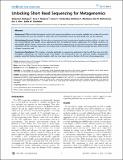| dc.contributor.author | Chisholm, Sallie (Penny) | |
| dc.contributor.author | Rodrigue, Sebastien | |
| dc.contributor.author | Materna, Arne | |
| dc.contributor.author | Timberlake, Sonia Crago | |
| dc.contributor.author | Blackburn, Matthew C. | |
| dc.contributor.author | Malmstrom, Rex R. | |
| dc.contributor.author | Alm, Eric J. | |
| dc.date.accessioned | 2010-12-22T20:22:59Z | |
| dc.date.available | 2010-12-22T20:22:59Z | |
| dc.date.issued | 2010-07 | |
| dc.date.submitted | 2010-05 | |
| dc.identifier.issn | 1932-6203 | |
| dc.identifier.uri | http://hdl.handle.net/1721.1/60369 | |
| dc.description.abstract | Background
Different high-throughput nucleic acid sequencing platforms are currently available but a trade-off currently exists between the cost and number of reads that can be generated versus the read length that can be achieved.
Methodology/Principal Findings
We describe an experimental and computational pipeline yielding millions of reads that can exceed 200 bp with quality scores approaching that of traditional Sanger sequencing. The method combines an automatable gel-less library construction step with paired-end sequencing on a short-read instrument. With appropriately sized library inserts, mate-pair sequences can overlap, and we describe the SHERA software package that joins them to form a longer composite read.
Conclusions/Significance
This strategy is broadly applicable to sequencing applications that benefit from low-cost high-throughput sequencing, but require longer read lengths. We demonstrate that our approach enables metagenomic analyses using the Illumina Genome Analyzer, with low error rates, and at a fraction of the cost of pyrosequencing. | en_US |
| dc.description.sponsorship | Gordon and Betty Moore Foundation (Marine Microbiology Initiative) | en_US |
| dc.description.sponsorship | Center for Microbial Oceanography: Research and Education | en_US |
| dc.description.sponsorship | United States. Dept. of Energy (Genome-to-Life) | en_US |
| dc.description.sponsorship | Natural Sciences and Engineering Research Council of Canada | en_US |
| dc.description.sponsorship | Fonds québécois de la recherche sur la nature et les technologies | en_US |
| dc.language.iso | en_US | |
| dc.publisher | Public Library of Science | en_US |
| dc.relation.isversionof | http://dx.doi.org/10.1371/journal.pone.0011840 | en_US |
| dc.rights | Creative Commons Attribution | en_US |
| dc.rights.uri | http://creativecommons.org/licenses/by/2.5/ | en_US |
| dc.source | PLoS | en_US |
| dc.title | Unlocking Short Read Sequencing for Metagenomics | en_US |
| dc.type | Article | en_US |
| dc.identifier.citation | Rodrigue, Sébastien et al. “Unlocking Short Read Sequencing for Metagenomics.” PLoS ONE 5.7 (2010): e11840. | en_US |
| dc.contributor.department | Massachusetts Institute of Technology. Department of Biological Engineering | en_US |
| dc.contributor.department | Massachusetts Institute of Technology. Department of Civil and Environmental Engineering | en_US |
| dc.contributor.approver | Chisholm, Sallie (Penny) | |
| dc.contributor.mitauthor | Chisholm, Sallie (Penny) | |
| dc.contributor.mitauthor | Rodrigue, Sebastien | |
| dc.contributor.mitauthor | Materna, Arne | |
| dc.contributor.mitauthor | Timberlake, Sonia Crago | |
| dc.contributor.mitauthor | Blackburn, Matthew C. | |
| dc.contributor.mitauthor | Malmstrom, Rex R. | |
| dc.contributor.mitauthor | Alm, Eric J. | |
| dc.relation.journal | PLoS ONE | en_US |
| dc.eprint.version | Final published version | en_US |
| dc.type.uri | http://purl.org/eprint/type/JournalArticle | en_US |
| eprint.status | http://purl.org/eprint/status/PeerReviewed | en_US |
| dspace.orderedauthors | Rodrigue, Sébastien; Materna, Arne C.; Timberlake, Sonia C.; Blackburn, Matthew C.; Malmstrom, Rex R.; Alm, Eric J.; Chisholm, Sallie W. | en |
| dc.identifier.orcid | https://orcid.org/0000-0001-8294-9364 | |
| dspace.mitauthor.error | true | |
| mit.license | PUBLISHER_CC | en_US |
| mit.metadata.status | Complete | |
